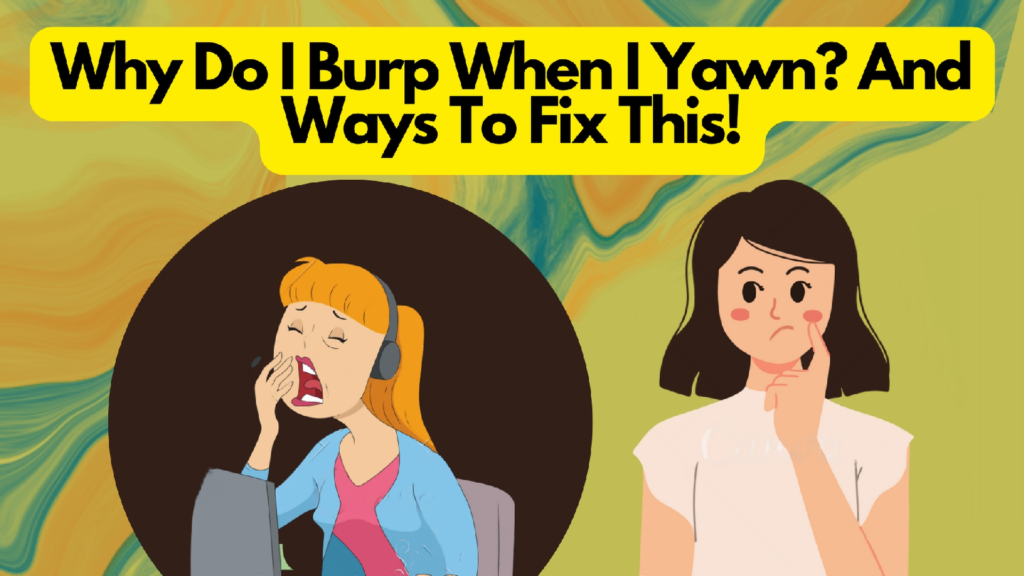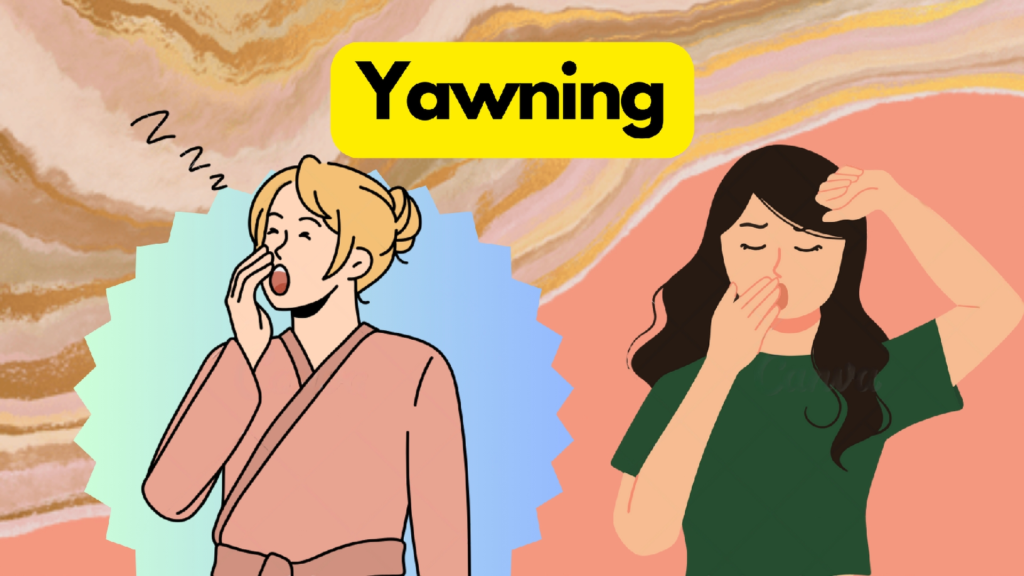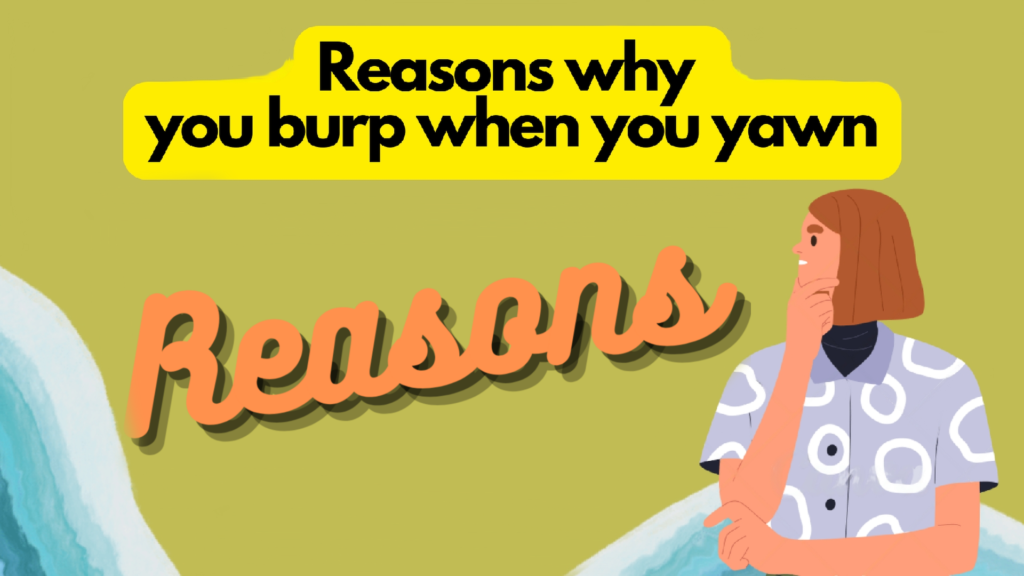Have you ever experienced the embarrassing moment of burping while yawning in public? If so, you may wonder: why do I burp when I yawn? This common occurrence is caused by the anatomy of our digestive system and the involuntary reflex of yawning. Although not usually a cause for concern, it can be an annoyance for some people. In this article, we’ll explore the reasons behind burping when yawning and provide ways to fix this issue. So, if you want to learn more about how to reduce or eliminate burping while yawning, keep reading!

Yawning

It is an involuntary reflex that involves opening the mouth wide and inhaling deeply, often associated with tiredness or boredom. It increases oxygen intake and helps regulate brain temperature. When we feel tired or bored, our breathing becomes shallow, and we may not inhale enough oxygen. Yawning could, therefore, provide a quick burst of oxygen to the brain, helping to increase alertness and focus.
Another theory suggests that yawning is a way of cooling down the brain. Research has shown that the temperature of the brain increases during periods of increased activity or stress, and yawning could help to reduce this temperature by increasing blood flow to the brain.
Interestingly, yawning is contagious, which means that seeing someone else yawn can trigger a yawn in ourselves. This phenomenon is thought to be related to social bonding, as yawning has been observed in a range of social situations, including when animals are in groups or when humans interact with others.
While yawning is generally harmless, some people may experience medical conditions that lead to excessive yawning. For example, people with sleep disorders, migraines, or multiple sclerosis may experience frequent and uncontrollable yawning as a symptom of their condition.
Burping
Burping, also known as belching, is a common bodily function that involves the release of gas from the stomach through the mouth. This can occur spontaneously or as a result of eating or drinking.
The reason for burping is due to the build-up of gas in the stomach. When we eat or drink, we swallow air along with the food or liquid. This air can become trapped in the stomach, along with other gases produced during digestion, such as carbon dioxide and methane. Burping allows this gas to escape, relieving the feeling of bloating or discomfort.
While burping is a normal bodily function, excessive or persistent burping may be a sign of an underlying medical condition. For example, gastroesophageal reflux disease (GERD), also known as acid reflux, can cause frequent burping as a result of stomach acid traveling up into the esophagus. Other conditions, such as irritable bowel syndrome (IBS) or lactose intolerance, may also cause excessive burping as a symptom.
Certain habits, such as eating too quickly, chewing gum, or drinking carbonated beverages, can also lead to increased burping. In some cases, burping may be a side effect of medication or a result of certain medical procedures, such as surgery on the digestive system.
To reduce the likelihood of burping, it may help to eat and drink more slowly, avoid carbonated beverages, and avoid chewing gum. If burping is a persistent problem, it is recommended to speak with a healthcare professional to determine the underlying cause and appropriate treatment.
Reasons why you burp when you yawn

Many people may wonder, “why do I burp when I yawn?” Burping is a common bodily function that involves the release of gas from the stomach through the mouth, while yawning is an involuntary reflex that involves taking in a deep breath.
The reason for burping during yawning is not entirely clear, but it may be due to the relaxation of the muscles that control the esophagus. When we yawn, the muscles in our throat and mouth relax, allowing us to take in a deep breath. However, this relaxation could also allow air to enter the esophagus, leading to a burp.
In some cases, burping during yawning may also be due to the buildup of gas in the stomach. This can occur if a person has swallowed air while eating or drinking, or if certain foods or beverages, such as carbonated drinks, produce excess gas during digestion.
While burping during yawning is generally harmless, it can be uncomfortable or embarrassing for some people. To reduce the likelihood of burping during yawning, it may help to take slower, more controlled breaths or to swallow before and after a yawn to prevent air from entering the esophagus.
However, it is important to note that excessive or persistent burping may be a sign of an underlying medical condition. Gastroesophageal reflux disease (GERD), also known as acid reflux, can cause frequent burping as a result of stomach acid traveling up into the esophagus. Other conditions, such as irritable bowel syndrome (IBS) or lactose intolerance, may also cause excessive burping as a symptom.
Tips on how to stop burping when you yawn
Here are some ideas that might help you stop burping when you yawn:
- Try to breathe through your nose: Breathing through your mouth can lead to swallowing air, which can cause burping. Breathing through your nose can help you avoid this.
- Slow down your eating: Eating too quickly can lead to swallowing air, which can cause burping. Try to eat slowly and chew your food thoroughly.
- Avoid carbonated drinks: Carbonated drinks can cause you to burp more frequently. Try to avoid these types of drinks if you’re prone to burping.
- Avoid chewing gum: Chewing gum can cause you to swallow air, which can lead to burping. If you need to freshen your breath, try using a breath mint instead.
- Take a break from eating: If you feel like you need to yawn during a meal, try taking a break and waiting until you’re finished eating. This can help you avoid swallowing air.
- Don’t talk while eating: Talking while eating can cause you to swallow air, which can lead to burping. Try to avoid talking until you’ve finished your meal.
- Drink water: Drinking water can help to flush out excess air in your stomach and reduce the likelihood of burping.
- Try relaxation techniques: If you’re prone to burping due to anxiety or stress, try practicing relaxation techniques like deep breathing or meditation.
- Avoid fatty or spicy foods: Fatty or spicy foods can cause your stomach to produce more acid, which can lead to burping. Try to avoid these types of foods if you’re prone to burping.
- See a doctor: If you’re experiencing excessive burping, it may be a sign of a more serious medical condition. If your burping is persistent or accompanied by other symptoms, it’s important to see a doctor for an evaluation.
Frequently Asked Questions (FAQs)
Why do I burp when I yawn?
There is a reflex arc that connects the two activities. When you yawn, the air pressure in your lungs decreases, and this decrease in pressure is sensed by the nerves in your stomach. These nerves then send a signal to the brain telling it to burp.
Can anxiety cause yawning and burping?
Yes, anxiety can cause yawning and burping. Anxiety can cause changes in your breathing pattern, leading to an increase in yawning. Additionally, anxiety can also cause you to swallow more air, which can lead to more burping.
Why do I make a noise when I yawn?
The noise you make when you yawn is often due to the movement of air through your throat and mouth. When you yawn, your mouth opens wide, and the movement of air can create noise. This noise is usually nothing to worry about and is a normal part of yawning.
Is yawning due to lack of oxygen?
While yawning can be a sign of fatigue, it is not necessarily due to a lack of oxygen. In fact, researchers are not entirely sure why we yawn, but it is thought to be a way to regulate brain temperature or increase blood flow to the brain.
Is it bad to burp a lot on purpose?
Burping on purpose (also known as “belching”) is not necessarily bad for you, but it can be considered impolite in some cultures. If you are burping frequently, it may be a sign that you are swallowing too much air or that there is an underlying digestive issue that needs to be addressed.
What is supragastric belch?
Supragastric belch is a condition where air is involuntarily and repeatedly sucked into the esophagus and then expelled rapidly, resulting in a loud burp-like sound. It is considered a functional disorder and can be caused by a variety of factors, including stress, anxiety, or abnormalities in the function of the esophageal muscles.
To summarize
Burping when yawning can be a common occurrence for some individuals. But why do I burp when I yawn? The answer lies in the anatomy of our digestive system. When we swallow food or drink, a small amount of air gets trapped in our stomach. This air needs to escape, and the body accomplishes this by burping.
Yawning, on the other hand, is an involuntary reflex that serves to increase oxygen intake and regulate the body’s temperature. When we yawn, we also swallow air, which can lead to the air in the stomach being forced upward, resulting in a burp.
While burping when yawning is generally not a cause for concern, it can be an annoyance or embarrassment for some people. If you want to reduce or eliminate this issue, there are several ways to fix it.
One method is to practice deep breathing techniques that can help you avoid swallowing air when yawning. Another option is to chew gum or suck on hard candies, which can stimulate the production of saliva and promote swallowing, thereby helping to release the air in the stomach.
In some cases, burping when yawning may be a symptom of an underlying medical condition such as acid reflux, which can cause excessive burping and discomfort. If you experience this issue frequently or have other digestive symptoms, it’s best to consult a doctor.
In summary, burping when yawning is a common occurrence caused by the involuntary reflex of yawning and the presence of air in the stomach. While it’s generally not a cause for concern, there are ways to fix it, including deep breathing techniques, chewing gum or sucking on hard candies, and seeking medical attention if necessary.






